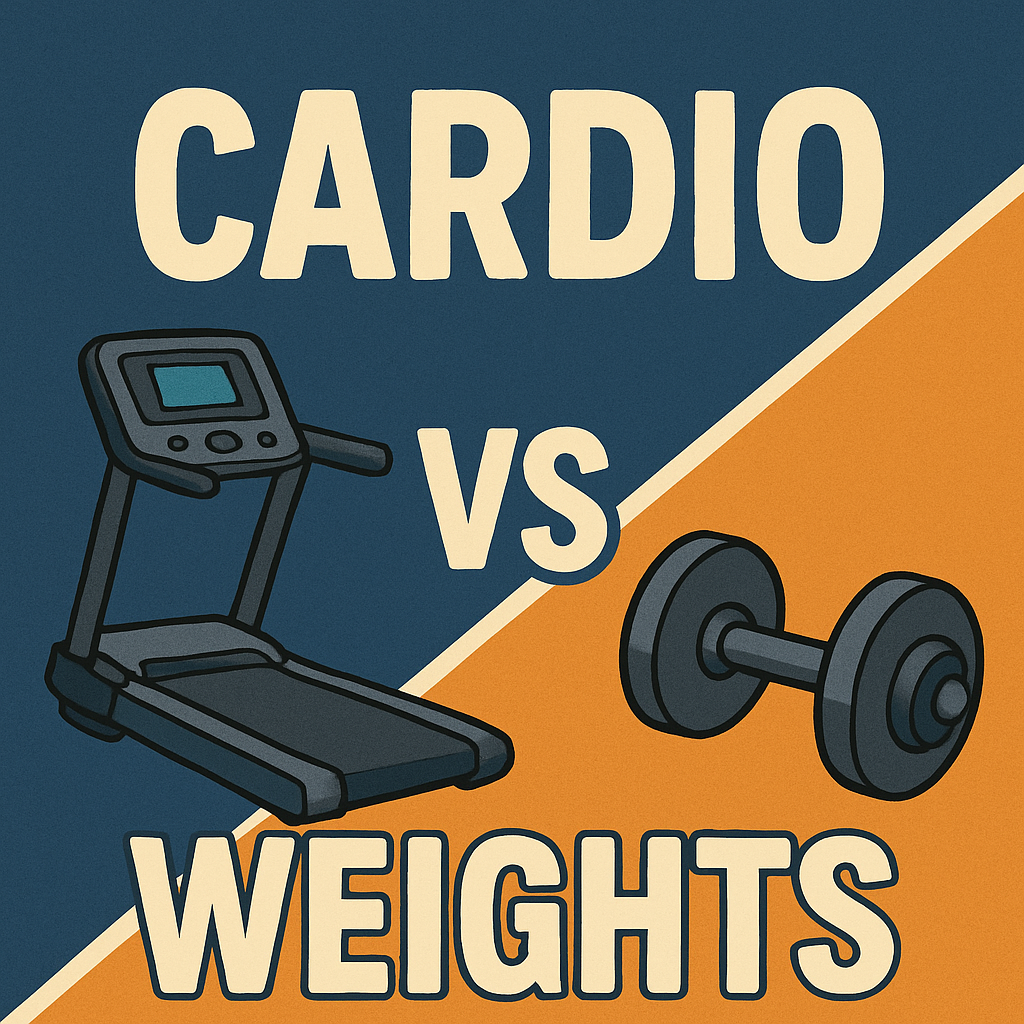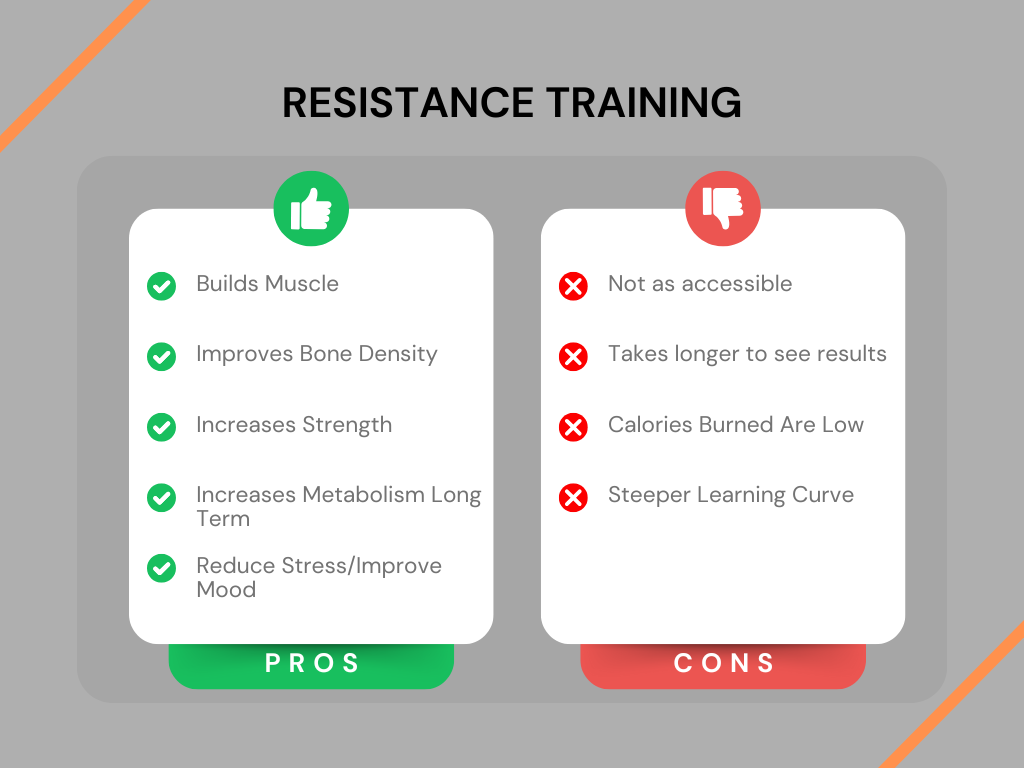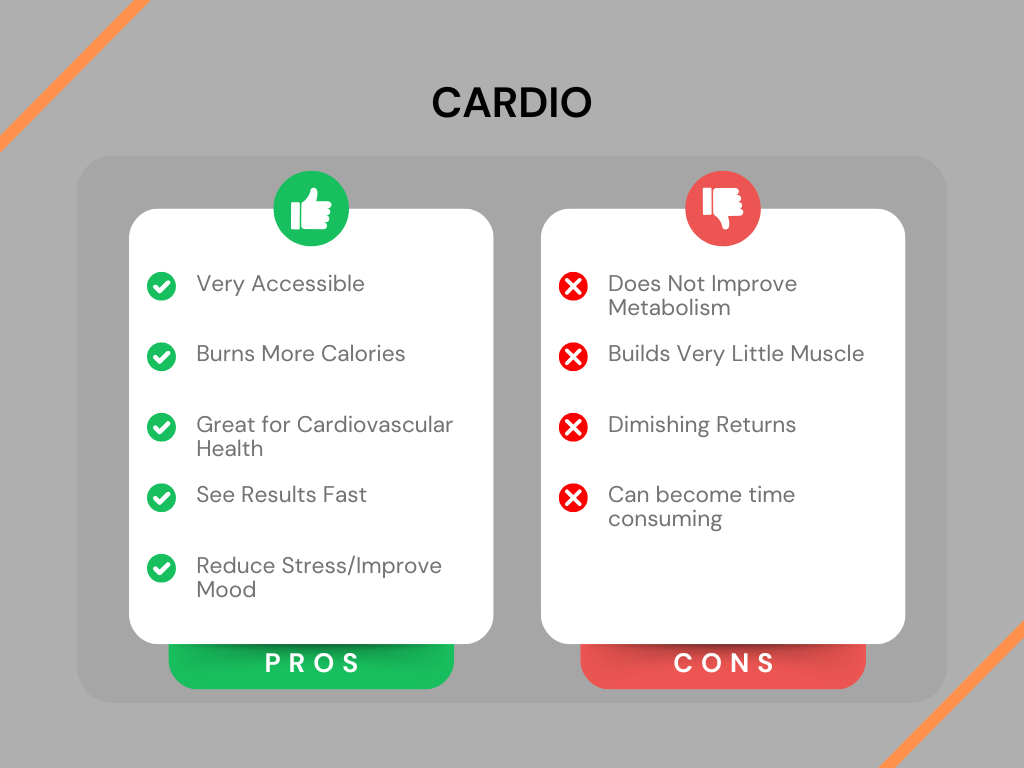Losing Weight: Cardio vs Weights
Are you starting a health kick or wanting to shift some weight and asking yourself: “should I do weights or cardio”? The answer is more nuanced than just saying one or the other. Luckily, I will provide that nuance and you can make your decision on which is best for you.
Before discussing which is better, we must understand the weight loss basics. I have an article here that goes into more depth on this topic here. To save time, I will give you a quick summary:
You must burn more calories than you consume
You need to find a diet plan that works for you
Find exercises that you enjoy and can continue long term
Now lets discuss the benefits and drawbacks of cardio and weights and then how they can relate to your short or long term goals.
Weights (Resistance Training)
Pros
1. Builds Muscle
When you build muscle, your body naturally burns more calories — even at rest. This is because muscle tissue is “metabolically active,” meaning it requires more energy to maintain than fat does.
👉 For fat loss: More muscle = higher metabolism. That means your body becomes more efficient at burning calories all day long, not just during workouts.
2. Improves Bone Health and Keeps You Moving
Resistance training strengthens your bones and joints, which helps you stay active, mobile, and injury-free — especially as you age. (PMID: 37961491)
👉 For fat loss: The more active and injury-free you are, the more consistently you can train. This adds up to more movement, more energy used, and better long-term results.
3. Boosts Your Metabolism
Strength training creates a small “afterburn” effect — your body keeps using energy after the workout to repair and grow muscle tissue. Plus, having more lean muscle raises your resting metabolism over time.
👉 For fat loss: You might not burn as many calories during the workout, but you’re setting your body up to burn more calories every day.
4. Shapes Your Body
Cardio can help you lose weight, but resistance training helps you change your body shape. It builds definition, lifts muscle tone, and creates a “lean” look — especially when combined with a calorie-controlled diet.
👉 For fat loss: You’re not just losing weight — you’re creating a stronger, firmer, more defined version of yourself.
5. Improves Mood & Reduces Stress
Studies show that strength training helps reduce anxiety, improve mood, and boost self-confidence. This can reduce emotional eating or binge habits linked to stress.
👉 For fat loss: When you feel better mentally, it’s easier to make good food choices and stay consistent with your plan.
Cons
1. Doesn’t Burn As Many Calories During the Workout
Compared to a cardio session (like running or HIIT), lifting weights burns fewer calories in the moment.
👉 Fat loss tip: Think long-term. Resistance training helps build the kind of body that burns calories all the time — not just when you're sweating.
2. Results Take Time — Especially Visually
You may feel stronger quickly, but changes in the mirror can take a few weeks, even months. Unlike cardio (which can show faster weight loss on the scale), resistance training is more about body composition — how much fat vs. muscle you have.
👉 Fat loss tip: You might not see big weight changes, but you’ll notice clothes fitting better, more tone, and improved shape.
3. It Can Be Hard to Start
Using weights or gym equipment can feel intimidating if you’re new. You may feel like everybody is watching you do an exercise incorrect. That is not the case, everyone is way more interested in their own workout compared to what everyone else is doing.
👉 Fat loss tip: You don’t have to start with heavy weights. Bodyweight training at home (like squats, push-ups, glute bridges) still counts — and helps build the base you need to progress. If you need more help in getting started, you can always contact me for help.
4. Not Always Easy to Access
Gyms cost money, and not everyone has equipment at home. This can be a barrier if you're starting from scratch.
👉 Fat loss tip: You can still get results using resistance bands or bodyweight or get yourself a couple of adjustable dumbbells - as long as you push your muscles consistently. We also offer a 12 week training program based on your goals and available equipment for just £25.
Cardio
Pros
1. Easily Accessible
You don’t need a gym or equipment to get started — just a pair of trainers and a place to move. Walking, jogging, or dancing in your living room all count. A lot easier than getting your own dumbbells or a gym membership.
👉 For fat loss: The easier it is to do, the more likely you are to stick with it. And consistency is everything when it comes to losing weight.
2. Burns More Calories During the Workout
Cardio typically burns more calories per minute than resistance training. The harder you work (e.g. running vs walking), the more energy you use. Even an incline walk will typically burn more calories than a weights session. This is partly due to the rest periods of 1-3 minutes you have inbetween sets.
👉 For fat loss: This can help you create a calorie deficit faster, especially in the early stages of your weight loss journey.
3. Great for Heart Health
Cardio strengthens your heart, improves circulation, and increases your stamina. This helps you feel more energised in daily life.
👉 For fat loss: The fitter you are, the more active you’ll be throughout the day — which adds up to more calories burned overall.
4. You See (Some) Results Quickly
Because cardio burns a lot of energy, you might notice weight drop on the scales fairly quickly — only when you are still in a calorie deficit. For example, if you start your weight loss plan with a 500 calorie a day deficit and then add 500 calories worth of cardio on top of that, you’re accelerating your fat loss results.
👉 For fat loss: This early progress can feel motivating. Just remember: the scale isn’t the full story (you want to keep muscle, not just lose weight).
5. Boosts Mood & Reduces Stress
Even a short walk can lift your mood. Cardio boosts feel-good chemicals in your brain, helping to lower anxiety and improve sleep.
👉 For fat loss: When you feel better, you’re more likely to make healthy choices — and less likely to turn to food for comfort.
Cons
1. Does Not Improve Metabolism
Cardio burns calories while you're doing it, but it doesn’t boost your metabolism much afterward.
Why it matters for weight loss:
Your metabolism is like your body's engine – it controls how many calories you burn at rest. Strength training (like lifting weights) can help you burn more calories even after you're done exercising because it builds muscle. Cardio doesn’t do that as much, so you're mostly burning calories only during the workout.
2. Builds Very Little Muscle
Cardio doesn’t help you gain much muscle.
Why it matters for weight loss:
More muscle means your body burns more calories naturally, even while resting. Since cardio doesn’t build much muscle, it won’t help increase your resting calorie burn as much as strength training would.
3. Diminishing Returns
The more cardio you do, the less effective it becomes over time unless you keep increasing how much or how hard you work out.
Why it matters for weight loss:
At first, cardio can help you lose weight quickly. But over time, your body gets used to it and becomes more efficient and burns fewer calories doing the same exercise. This means you may need to do more and more cardio to keep losing weight at the same rate, which can be frustrating.
4. Can Become Time Consuming
Cardio workouts can take a long time if you're using them as your main way to lose weight. You can just increase the intensity rather than the amount of time you spend doing cardio, however you can only increase the intensity so much.
Why it matters for weight loss:
If you're relying only on cardio, you might need to spend a lot of time working out each week to keep seeing results. That can be hard to stick with and may lead to burnout.
What’s Best?
Fitness is more nuanced than “this is the best” and any recommendation requires context. My recommendation would be based on your short and long term goals as well as your preferences.
For example, if you have a wedding coming up in a couple months and want to fit into a smaller trouser or dress, I would say focus on cardio for faster results. Alternatively, for someone who’s new years resolution is to lose weight and keep it off long term but also hates cardio, I would suggest resistance training.
In most scenarios, doing a mixture of both alongside a calorie deficit will yield excellent results. A basic plan I would recommend if you’re able to exercise 3 days a week would be:
Monday: Resistance Training (Upper Body)
Wednesday: Cardio (your favourite type)
Friday: Resistance Training (Lower Body)
Another way would be to resistance train 3 days a week and finishing some sessions with cardio.
If you’re still not sure how to start your weight loss journey, get in contact for some coaching.
TLDR
Do the one you are most likely to stick to long term alongside a calorie deficit and you will achieve great results.
Cardio will give you better short term results, weights better long term results.
Do both to reap the long term benefits of each.
Hire me as your coach if you need help.


